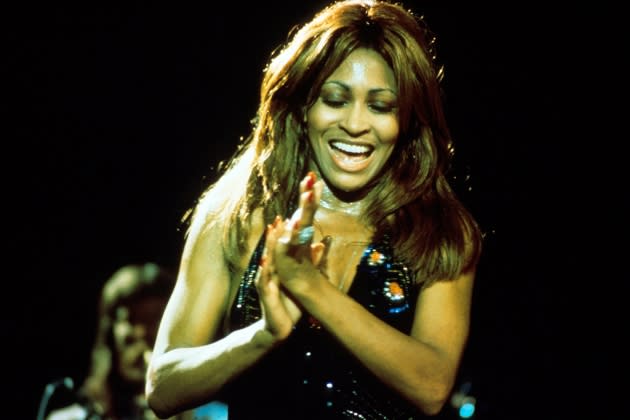Tina Turner’s Solo Debut Was a Country Album. Why Hasn’t the Genre Claimed Her as Its Own?
- Oops!Something went wrong.Please try again later.
- Oops!Something went wrong.Please try again later.

In her 2022 book Black Country Music: Listening for Revolutions, author Francesca T. Royster devotes an entire chapter to Tina Turner — who died Wednesday at 83 — and her complicated relationship with country music. Despite recording a series of country songs by Dolly Parton, Hank Snow, and Kris Kristofferson for her 1974 solo debut Tina Turns the Country On!, the album remains a curiosity, or entirely unknown, by today’s country music listener. What’s more, Nashville and the genre have yet to embrace Turner the way it has other country-adjacent icons like Ray Charles, Wanda Jackson, or even Gregg Allman. Royster, in her own words, says Turner’s Nashville flowers are well overdue.
Tina Turner’s sound, her ability to tell her story, and the integration of the personal in her art are all very central country music aspects. But country music hasn’t claimed her in the way that it really should. Her album Tina Turns the Country On! is one that more country music listeners need to know. It’s out of print now, but even so the album hasn’t made the impact that it deserves.
More from Rolling Stone
Tina Turner Was Open About Ike's Abuse -- Rappers Made Her A Punchline
Cher Reflects on Visiting 'Perfect Friend' Tina Turner Before Her Death
In her memoir, I, Tina, she says that country music was among the music that she really listened to. With “Nutbush City Limits,” an earlier recording with Ike Turner, she experimented with a rock-country hybrid, and soul as well, that talked about a country experience and the experience of growing up in a small town. “Nutbush City Limits” is about the experience of walking a thin line, of being under surveillance, as Black folks and as a Black woman. There was a sense of tension underneath the surface, for a lot of Black folks in general, but especially for Black performers in the Seventies and onward. There was a pressure to distance oneself from Black migration and from Southern experiences and represent a more slick image.
So, to turn to country music on Tina Turns the Country On! was a brave movement. She was doing this in a market where there was very little room for Black artists to make country music albums. Even those like Bobby Womack, or Millie Jackson, who had a career elsewhere were unable to get the traction that they really wanted. It was a risk-taking move, and one that focused on reflection, sadness, and mourning. It was different than other work that she’d done — like being the Acid Queen in Tommy, for instance. The pace of her country album is much slower and uses silence in a way that you don’t hear in some of her other music. The whole mood of Tina Turns the Country On! is so different than the music she had made before, and maybe the music that she made after.
Still, you can hear the country and soul in later songs like “I Can’t Stand the Rain.” It’s a bluesy song, but she’s playing with twang. And her songs where there’s a story, like “Private Dancer,” could easily be a country song with different production.
Even so, as a superstar, Tina Turner made an impact on country music, especially on country music women who are learning how to treat their own careers with agency. You can hear it in LeAnn Rimes and Brandi Carlile. Her ability to weaponize lots of different kinds of music in her sound and to control the stage as a solo artist is an important part of what it means to be a woman and a superstar in whatever genre you’re in. Black country music artists, like Rissi Palmer or Amythyst Kiah or Mickey Guyton, cite her not only as an influence, but as someone who showed them that it was possible to create music within the genre of country, even as someone who had a previous career. But country music at large could still reckon with Tina Turner’s power as a storyteller.
Best of Rolling Stone
